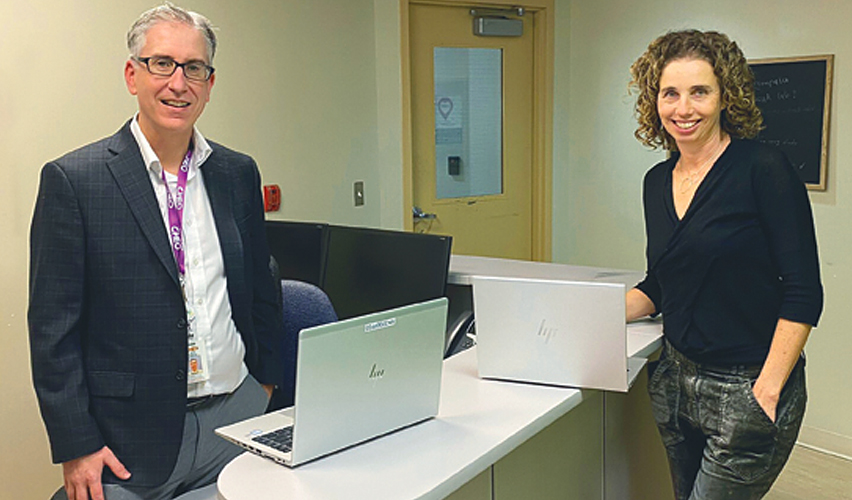Feature Story

CHEO keeps up to date through lifecycle program with Nova Networks
January 31, 2024
Overseeing the purchase, repair and replacement of 3,800 desktops, laptops, notebooks, kiosks and shared workstations at the Children’s Hospital of Eastern Ontario (CHEO) used to be a lot more of a headache before it signed a device lifecycle management agreement in 2019 with Nova Networks, an IT services company with 400 staff and offices in Ottawa, Toronto, Calgary, Hudson, Quebec, and Ogdensburg, New York.
“We used to sit with devices that would age out before we got them replaced,” recalled CHEO chief information officer Mari Teitelbaum. “We struggle to keep up with the evergreening of our end-user devices because it always seemed to be a lower priority than calls to the helpdesk and the projects we were working on.”
As part of its lifecycle management offering, Nova Networks works with CHEO to assemble a catalog of approved devices and schedules when models are to be replaced. It warehouses an inventory of spares for just-in-time replacement, loads the devices with the required software, delivers and can deploy them and provides repair services as required.
“The main problem it solves is ensuring that end-users have a positive experience with the devices they’re using because the last thing they want is to work with an old, antiquated computer that should have been retired two or three years earlier,” said Tyson Roffey, Nova Networks’ vice-president, digital health. “By participating in a device lifecycle management program, CHEO’s equipment won’t be any older than, say, five years. That’s the most important benefit because it directly links to patient care.”
Warehousing of replacement devices at Nova Networks also benefits CHEO because “it insulates us from supply chain shortages,” said Brian Vezina, CHEO’s manager of IT Services. If a computer needs to be replaced on short notice, chances are Nova Networks already has it in inventory.”
“If there’s a ransomware attack or a situation like what happened during COVID, when everyone was scrambling to find inventory, a lifecycle management client would be able to sleep better knowing we’re holding inventory for them,” added Marty Belair, Nova Networks’ director of sales.
Just having replacement inventory offsite is important because finding space in the hospital to store computers was always a challenge, noted Teitelbaum. And offsite warehousing benefits CHEO financially because the hospital only pays for the equipment when it’s deployed.
“We receive all of CHEO’s equipment at our integration centre and we do all of the imaging and asset tagging prior to deployment,” explained Belair, “The image has all of CHEO’s approved applications baked into it, so we get a device, and load the image because it’s more efficient to have the applications installed in a base image rather than installing the applications one at a time.”
Nova Networks staff can also schedule the installation of the equipment with the end-user and remove the retired device for decommissioning and disposal, even supplying CHEO with a certificate guarantying data security.
Equipment under warranty is repairable by Nova authorized technicians, freeing CHEO’s staff from having to spend time dealing with hardware issues.
CHEO chooses to purchase its equipment outright, but a Nova Networks sister company offers hospitals customizable financing arrangements, including leasing and the inclusion of software and support services as part of a per user or per device monthly fee.
The lifecycle management program is especially popular with smaller hospitals that don’t have the staff dedicated to making sure everyone’s device is refreshed on an approved cycle, said Belair. “Otherwise, devices could remain in service until they break or their OS is so old that it’s unsupported.”
Nova Networks works with 14 to 16 smaller hospitals in Eastern Ontario, as well as other hospitals in Northern Ontario and across the country, several of which have opted for its lifecycle management program. It also provides monitoring and management services, cybersecurity consulting, and staff augmentation services.
Belair cited the example of a curbside pickup project the company carried out for CHEO during the COVID-19 pandemic when approximately 1,000 remote workers had to be supplied with new security and remote access software.
“We had to schedule and co-ordinate every single CHEO user working remotely to come into a quarantine location with their device. We had staff at the location greeting people, disinfecting their device and adding the software because it wasn’t something that could be pushed out remotely. We had to run a script on each device, so we were able to offload a major task for the client while they were busy trying to deal with the pandemic.”
It was a great example of how Nova Networks serves an as extension of CHEO’s IS department and how we can call on them when needed, agreed Vezina. “We were so used to doing deployments with everyone on the network, and with so many of our people gone home, we needed to do it differently, so it was great to have Nova Networks help with the task.”
